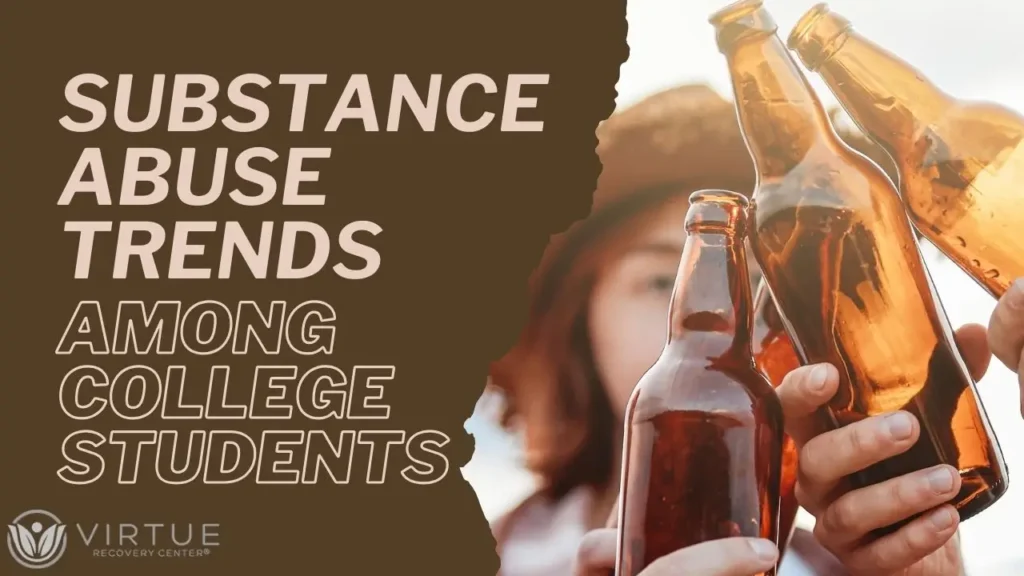Would you be surprised to learn that Arizona has a very high rate of substance abuse among college students.? This silent epidemic has taken hold of campuses, with recent reports indicating a notable surge in the volume of young adults entangled in the web of substance misuse. In the sprawling deserts of Arizona, the vibrant life of college campuses belies a growing crisis that demands immediate attention. From the vibrant nightlife of Tucson to the bustling streets of Phoenix, substance abuse is no stranger to the collegiate scene, making comprehensive addiction treatment services not just a mere option but a necessity for the health and future of these young scholars.

Your awareness of these trends is instrumental as we delve deeper into the causes, repercussions, and solutions to this problem. Shedding light on the magnitude of substance misuse among young adults is crucial in catalyzing change and sculpting a safer academic environment for all. What awaits is an exploration of the actions being taken in the Grand Canyon State to curb this issue and how students themselves are being empowered to rise above the challenges of addiction.
The Rising Concern of College Student Substance Abuse Arizona
The increasing prevalence of substance misuse within Arizona’s academic institutions has led to a necessary expansion of substance abuse treatment options for students. As an individual invested in the welfare of these young adults, understanding the scope of this issue is indispensable. The landscape of Arizona college substance abuse help is evolving, with universities implementing new programs and resources.
Colleges are becoming more proactive, offering substance abuse counseling Arizona-based services on campus. These are evidence-based programs geared toward helping students navigate the complexities of substance dependency while pursuing their educational goals. Below is an overview of the available resources and initiatives strengthening the support system for affected students.
| Resource | Description | Availability |
|---|---|---|
| Onsite Counseling | Licensed professionals conduct individual and group counseling sessions. | Widely available at most colleges |
| Peer Support Programs | Support networks consisting of trained students who offer guidance and understanding. | Present in several institutions |
| Online Therapy Platforms | Virtual counseling services to ensure constant access to mental health support. | Increasingly adopted |
| Educational Workshops | Workshops focusing on awareness, prevention strategies, and healthy coping mechanisms. | Commonplace across universities |
| Recovery Communities | Campus groups that foster a supportive environment for students in recovery. | Available at select campuses |
Armed with an understanding of the resources at your disposal, encouraging those affected to seek help is significant. These substance abuse treatment options for students aim to provide not just immediate assistance but also a path toward sustained recovery and academic success. With the right support, Arizona’s students can overcome the challenges of substance abuse and thrive both personally and academically.
Understanding the Link Between Substance Use and Health Risks
As college students navigate the complexities of higher education, it is vitally important to address the real and present connections between substance use and health complications. With the landscape of legal substance availability changing, particularly around cannabis, drugs, and alcohol, education for college students takes on new urgency. Such initiatives aim to enlighten young minds on the impacts substances may have on their well-being, an area of concern brought into sharp focus by recent medical research.
Recent Studies Highlighting Cannabis Use and Cardiovascular Risks
The latest findings in medical research indicate a troubling link between cannabis use and cardiovascular health, particularly in college-aged populations. These studies suggest a heightened risk for heart attacks and strokes, even with infrequent use. This new data is critical as it dispels the notion that cannabis is a low-risk substance, a misconception that may be becoming more widespread as cannabis legalization progresses.
Comparing the Impacts of Substance Choices on Student Health
Equipped with student alcohol and drug abuse resources, educators are better poised to communicate how different substances uniquely affect health. Alcohol, for example, is well-documented in its potential to lead to chronic issues and complex health scenarios, much like the use of tobacco. However, the growing body of evidence showing a significant correlation between cannabis and cardiac diseases bears particular attention. There’s an escalating requirement for university alcohol awareness programs and drug and alcohol education initiatives that comprehensively inform students about these consequences.
Substance Abuse Prevention and Support Resources at Arizona Universities
Arizona’s higher education landscape is actively developing strategies to mitigate the growing concerns around substance misuse. Substance abuse prevention programs implemented across Arizona universities serve as a testament to the proactive steps being taken to ensure the well-being of their students. You’ll find that these initiatives not only aim to raise awareness about the risks associated with substance abuse but also make accessible a plethora of intervention resources for substance abuse.

Based on the “Health and Wellness 2021 Insights Report Series” from the University of Arizona, there is a notable trend indicating a decrease in alcohol abuse among college students. Specifically, the report highlights a significant reduction in alcohol consumption over the past five years, with a 19% decrease in alcohol use in the past year compared to the previous four-year average. Additionally, alcohol use in the past 30 days saw an even more substantial decrease of 29%. This downward trend in alcohol consumption among college students can be attributed to the impacts of the COVID-19 pandemic, which likely led to students spending less time in social settings or living with parents, thereby reducing opportunities for alcohol use. The report also notes that 36% of students did not drink alcohol in the past year, further underscoring the trend towards decreased alcohol abuse(1).
This data is crucial as it suggests a positive shift in student health and wellness behaviors, potentially influenced by the unique circumstances of the pandemic. It also reflects the effectiveness of ongoing health and wellness initiatives aimed at reducing substance abuse on campus. The decrease in alcohol consumption among college students is a promising development, indicating progress in efforts to promote a healthier, more responsible approach to alcohol use within the university community the preventive measures mental health support for students play a crucial role as it intertwines with substance abuse resources to form a comprehensive safety net. Whether you’re in need of advice, someone to listen, or clinical intervention, Arizona universities offer extensive support systems dedicated to assisting you through various challenges.
Implementation of Substance Abuse Prevention Programs
The various substance abuse prevention programs underway at Arizona universities are a reflection of their commitment to student health and safety. These resources emphasize not only the avoidance of addictive behaviors but also the promotion of positive, health-conscious decisions. If you seek information or support, rest assured that you’ll find Arizona universities’ substance abuse resources readily available.
Mental Health Support Networks and Counseling in Arizona
Understanding the symbiotic relationship between mental health and substance misuse, Arizona universities offer robust mental health support for students. These support networks are rich with counseling options, delivering an environment conducive to open dialogue. You’ll have access to counselors skilled in guiding students through stress management, substance intervention, and the development of healthier coping mechanisms.
Addressing the Challenge: Intervention and Treatment Options for Students
As the issue of substance abuse continues to be a significant challenge among college students, intervention and treatment programs are becoming more vital than ever. In particular, Arizona colleges advocate for initiatives supporting individuals in need, offering crucial assistance, and building a safer academic environment.
Role of College Substance Abuse Intervention Programs
College substance abuse intervention programs are tailored to meet the demands of a student’s life, focusing on early intervention and providing a network of support. Schools have dedicated significant efforts to fostering these proactive systems, equipping students with the ability to recognize substance misuse early on and to seek appropriate help. Interventions cover a wide range of activities, such as educational workshops, peer-led support groups, and access to counseling services, all intended to help students navigate the pressures of college life and to develop sound coping strategies for college students.
Comprehensive Addiction Treatment Services for Young Adults
Virtue Recovery Center, as a beacon of hope for young adults, stands out by offering comprehensive addiction treatment services designed with the understanding that each individual’s journey to recovery is unique. Their multi-faceted approach includes a blend of therapy modalities, holistic care, and continued post-treatment support to ensure students’ well-being beyond their years in college. The complementary services, including trauma-informed care and life skills training, underscore the center’s commitment to providing a solid foundation for lifelong sobriety and mental resilience.
Conclusion
In facing the robust challenges presented by college student substance abuse in Arizona, it is essential to adopt a comprehensive approach that encompasses education, prevention, and treatment to address this issue effectively. As you’ve learned throughout this article, the health risks linked with substance use are significant and varied, making the roles of drug and alcohol education initiatives all the more critical in the efforts to inform and protect our student communities. By offering accessible substance abuse counseling in Arizona and on campuses, we are fortifying the support network that can detect early signs of substance misuse and provide timely intervention resources for substance abuse.
Your awareness and participation in these initiatives are pivotal to their success. As we continue to introduce and improve upon these strategic responses, the hope is to witness a decline in the incidence of substance abuse among college students. In elevating the availability and visibility of these resources, Arizona’s higher education institutions are making strides toward healthier, safer, and more supportive learning environments. The cumulative efforts in education, policy, and healthcare services are integral in diminishing the prevalence and impact of substance misuse in our colleges and universities.
Ultimately, your engagement in upholding and advocating for these measures, whether as students, faculty, or community members, contributes to creating a balanced and nurturing academic landscape. With each step forward, there is potential to transform the lives of students and reinforce the foundation of their future successes, unburdened by the weight of substance abuse. Keep informed, stay proactive, and remember that your actions contribute to the betterment of our educational institutions and the well-being of all those who journey through them.
FAQ:
Q: What are the current substance abuse trends among college students in Arizona?
A: Substance abuse trends among college students in Arizona indicate an increase in drug use, particularly with opioids, cocaine, and marijuana.
Q: How serious is the issue of drug use among college students in Arizona?
A: Drug use among college students in Arizona is a significant concern, impacting their academic performance, health, and overall well-being.
Q: What is harm reduction, and how does it relate to substance abuse prevention?
A: Harm reduction refers to strategies aimed at reducing the negative consequences of drug use, which can play a crucial role in substance abuse prevention efforts.
Q: Who is eligible to seek treatment for substance use disorder in Arizona?
A: People with substance use disorder in Arizona are eligible to seek treatment, which may include licensed substance abuse technicians and behavioral health professionals.
Q: What measures are in place in Arizona to address drug overdose cases?
A: Arizona has implemented programs and initiatives to combat drug overdose, including training licensed substance abuse technicians and educating the public on overdose prevention.
Q: How are Arizona degree programs related to substance abuse treatment structured?
A: Degree programs related to substance abuse treatment in Arizona are designed to provide coursework on substance use disorder, treatment modalities, and relapse prevention strategies.
Q: What role does the Arizona Board of Behavioral Health play in regulating substance abuse treatment?
A: The Arizona Board of Behavioral Health oversees licensure and certification requirements for substance abuse counselors and treatment centers in the state.
References
- Campus Health Service, University of Arizona. (n.d.). ALCOHOL TRENDS at the University of Arizona. Retrieved from https://health.arizona.edu/sites/default/files/insights%20report%20HWS.pdf
- Arizona Criminal Justice Commission. (2022). 2022 Arizona Youth Survey State Report. Retrieved from https://www.azcjc.gov/Portals/0/Documents/pubs/AYSReports/2022/AYS_2022%20_State_Report_FINAL_09072022.pdf
- Arizona Department of Health Services. (n.d.). Appendix H: Youth Substance Abuse Prevention Program Final Report. Retrieved from https://www.azdhs.gov/documents/prevention/womens-childrens-health/injury-prevention/opioid-prevention/action-plan/report/appendix-h-youth-substance-abuse-prevention-program-final-report.pdf







